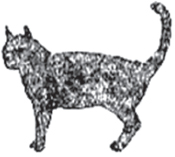A Gull on the Roof (24 page)
Read A Gull on the Roof Online
Authors: Derek Tangye
One day a man called at the cottage and said he was studying rock conditions in our area on behalf of a certain Ministry. He asked for permission to study those on our land.
‘Of course you can,’ I said, then added suspiciously, remembering the other activities, ‘if you’re looking for uranium I hope you won’t find it.’
The man stared at me. ‘But my dear sir,’ he said loftily, ‘if I found uranium just think how rich you would be!’
Jeannie was with me at the time and it was she who answered him. ‘Had we the choice,’ she said, ‘between a uranium mine and Minack, I can assure you we would choose Minack.’ The man retreated to his duties and Jeannie and I set off to weed the anemones.
We know now there is no possibility of any part of this area being exploited. Buildings and caravans are forbidden, there is no place for a motorway to go, it is too inaccessible even to fear the prospect of an atomic power station; and the scientists have announced the region is bare of uranium. Perhaps I am being overconfident. Such remoteness will always tempt someone to plot its destruction.
But today we can go out of the cottage and shout to the heavens and no one will hear; or lie on the rocks with only cormorants, oyster catchers and gulls as companions; or stroll in the wood with Charlie hopping from branch to branch above our heads, or pause to talk to Tim, or say to each other: ‘The gannets are passing along the coast early this year’ . . . ‘I saw the first whitethroat this morning’ . . . ‘If you look to the left of those quickthorns you will see a fox sunning itself in the bracken’ . . . ‘The Seven Stone lightship was towed past this morning’ . . . ‘We’ll have lunch on the rocks and watch the seal in the bay’ . . .
These belong to the pleasures which have pleased since the beginning of time. They await in remoteness, hiding their secret in solitude, unhurt by man-made glitter and away from his intrigue, seemingly insignificant moments which enrich the soul. They live with us at Minack so that whatever material disappointments we may have, however hard may be the consequences of a failed harvest, they take us forward again. It is a way of life which belongs to the ages instead of ourselves.
Monty was fifteen years old when he began to ail. There was nothing sudden about his illness, and as the weeks went by there were times when we made ourselves believe that we were worrying unnecessarily. Sometimes he was his old jaunty self, following us in our walks round Minack, then sitting purring on my knees in the evening. We made the customary remarks that are made by those who watch the sick. ‘I think the medicine has done him a lot of good’ . . . ‘He really enjoyed his walk this morning.’ And then quite suddenly the sickness within him began to hurry.
He died on a May morning, a morning that was soft and warm and full of sweet scents, the sort of morning Jeannie would have said to me: ‘Let’s take Monty for a walk before breakfast.’ As I was dressing he had begun to cry, and I knew instinctively there was nothing more that we could do. I went away to telephone the vet and when I returned I found Jeannie had carried him out into the sun. He was lying, breathing gently, stretched out on the grass; and, strangely, Charlie was on the ground within a yard of him, Tim was perched on a rosebush two feet from his head, and Hubert was up there on the roof. All were silent.
Monty was the only cat I had ever known and my loyalty was to him and not to his breed. One day during his illness I was telling him that I would never have another to replace him. I was in fact thinking of those sympathetic-meaning people who hasten to replace an old friend with a substitute. ‘The only exception,’ I said, and this I wrote down in my diary, ‘is if a black cat whose home could never be traced cried outside the door in a storm.’
At the beginning of March the following year, Jeannie and I became aware of a black cat running wild on our land. We scarcely took notice of it except to observe, after a time, that it was always on our land and never on that of our neighbours. But it was so wild that it was only a black dash in the distance.
One evening, at the beginning of April, Jeannie was sitting after dinner talking of Monty. A gale was blowing and rain lashed the cottage. Suddenly I said: ‘Did you hear a cry?’ And without waiting for Jeannie to answer I went and opened the door.
In came the black cat. She is beside me now as I end this story.
